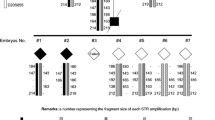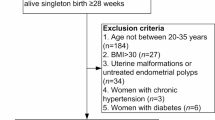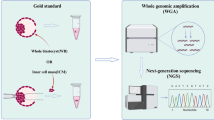Abstract
Purpose
To showcase the successful use of ICSI with PGT-M to overcome Beckwith-Wiedemann syndrome (BWS)–related reproductive challenges, resulting in the birth of a healthy baby boy. By targeting the maternally inherited CDKN1C pathogenic gene variant, this report highlights the genetic interventions in BWS reproductive risk management.
Methods
This case report describes a 41-year-old woman seeking fertility assistance after a previous pregnancy revealed a fetal anomaly related to BWS. Families with BWS recurrence face challenges, as maternally inherited CDKN1C pathogenic variants contribute to approximately 40% of genetic alterations, with a potential recurrence risk as high as 50%. Genetic analysis identified a pathogenic variant in the CDKN1C gene of the fetus that was maternally inherited. The pregnancy was terminated due to the fetal anomalies. The couple underwent intra-cytoplasmic sperm injection (ICSI) combined with preimplantation genetic testing for monogenic diseases (PGT-M) and preimplantation genetic testing for aneuploidy (PGT-A).
Results
Two embryos from IVF with low-risk PGT-M and euploid status. One transferred via frozen embryo transfer (FET) in February 2023 resulted in the successful birth of a healthy baby boy. This study reports the first successful delivery of a healthy boy after PGT-M for the CDKN1C gene variant c.79_100delinsGTGACC, contributing to the limited literature on successful outcomes for BWS.
Conclusion
Utilizing PGT-M in combination with IVF can lead to favorable outcomes in managing BWS-associated reproductive challenges, offering insights into potential genetic interventions and successful birth.

Similar content being viewed by others
Explore related subjects
Discover the latest articles and news from researchers in related subjects, suggested using machine learning.Data availability
Data regarding any of the subjects in the study has not been previously published. Data will be made available to the editors of the journal for review or query upon request.
References
Shuman C, Kalish JM, Weksberg R. Beckwith-Wiedemann syndrome. GeneReviews® 2000; Pubmed. Available from: https://www.ncbi.nlm.nih.gov/books/NBK1394/#. Accessed 20 Feb 2024.
Brioude F, Kalish JM, Mussa A, Foster AC, Bliek J, Ferrero GB, Boonen SE, Cole T, Baker R, Bertoletti M, et al. Expert consensus document: clinical and molecular diagnosis, screening and management of Beckwith-Wiedemann syndrome: an international consensus statement. Nat Rev Endocrinol. 2018;14(4):229–49. https://doi.org/10.1038/nrendo.2017.166.
Wang KH, Kupa J, Duffy KA, Kalish JM. Diagnosis and management of Beckwith-Wiedemann syndrome. Front Pediatr. 2020;21(7):562. https://doi.org/10.3389/fped.2019.00562.
Choufani S, Shuman C, Weksberg R. Beckwith-Wiedemann syndrome. Am J Med Genet. 2010;154C:343–54. https://doi.org/10.1002/ajmg.c.30267.
Weksberg R, Smith AC, Squire J, Sadowski P. Beckwith-Wiedemann syndrome demonstrates a role for epigenetic control of normal development. Hum Mol Genet. 2003;1:12. https://doi.org/10.1093/hmg/ddg067.
Harper JC, Sengupta SB. Preimplantation genetic diagnosis: state of the art 2011. Hum Genet. 2012;131(2):175–86. https://doi.org/10.1007/s00439-011-1056-z.
Yang IJ, Tu YA, Pan SP, Huang TC, Chen CL, Lin MW, Tsai YY, Yao YL, Su YN, Chen SU. First report of a successful pregnancy by preimplantation genetic testing for Beckwith-Wiedemann syndrome. Taiwan J Obstet Gynecol. 2022;61(1):174–9. https://doi.org/10.1016/j.tjog.2021.11.030.
Gardner DK, Lane M, Stevens J, Schoolcraft WB. Blastocyst score affects implantation and pregnancy outcome: towards a single blastocyst transfer. Fertil Steril. 2000;73(6):1155–8. https://doi.org/10.1016/s0015-0282(00)00518-5.
Acknowledgements
The authors would like to extend their appreciation to the iGenomix team for their invaluable counseling support, which played a crucial role in navigating the complexities of this study. The authors would also like to acknowledge the Orchid Medical and Embryology Team for their exceptional work. Their dedication and proficiency were pivotal in achieving a successful outcome.
Author information
Authors and Affiliations
Corresponding author
Ethics declarations
Ethical approval
Ethical approval was sought from the Dubai Scientific Research Ethics Committee (DSREC), which confirmed that approval was unnecessary for a single case report as it did not constitute research. However, the couple had already provided their consent.
Conflict of interest
The authors declare no competing interests.
Additional information
Publisher's Note
Springer Nature remains neutral with regard to jurisdictional claims in published maps and institutional affiliations.
Rights and permissions
Springer Nature or its licensor (e.g. a society or other partner) holds exclusive rights to this article under a publishing agreement with the author(s) or other rightsholder(s); author self-archiving of the accepted manuscript version of this article is solely governed by the terms of such publishing agreement and applicable law.
About this article
Cite this article
Banti, M., Kafetzis, D. First case report of a successful delivery of a healthy boy by preimplantation genetic testing for Beckwith-Wiedemann syndrome. J Assist Reprod Genet 41, 2771–2775 (2024). https://doi.org/10.1007/s10815-024-03186-7
Received:
Accepted:
Published:
Issue Date:
DOI: https://doi.org/10.1007/s10815-024-03186-7




